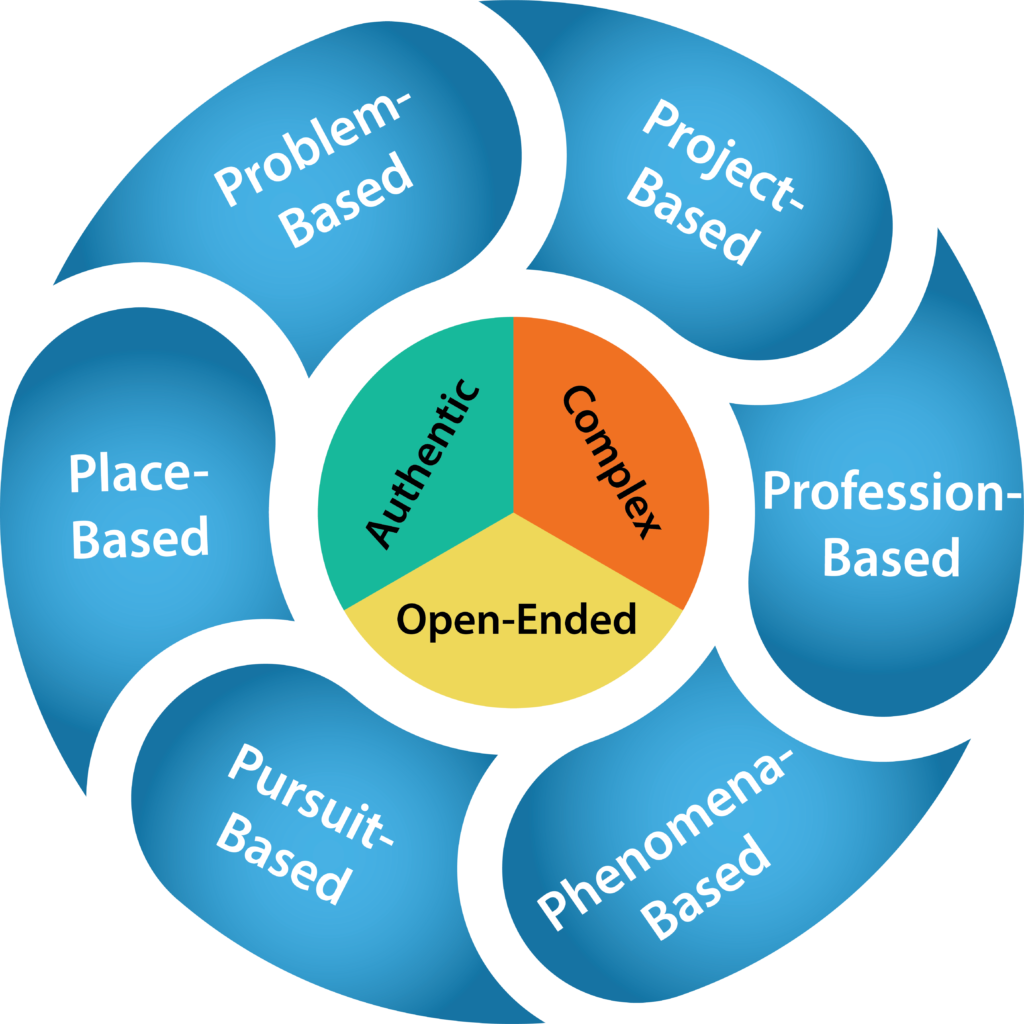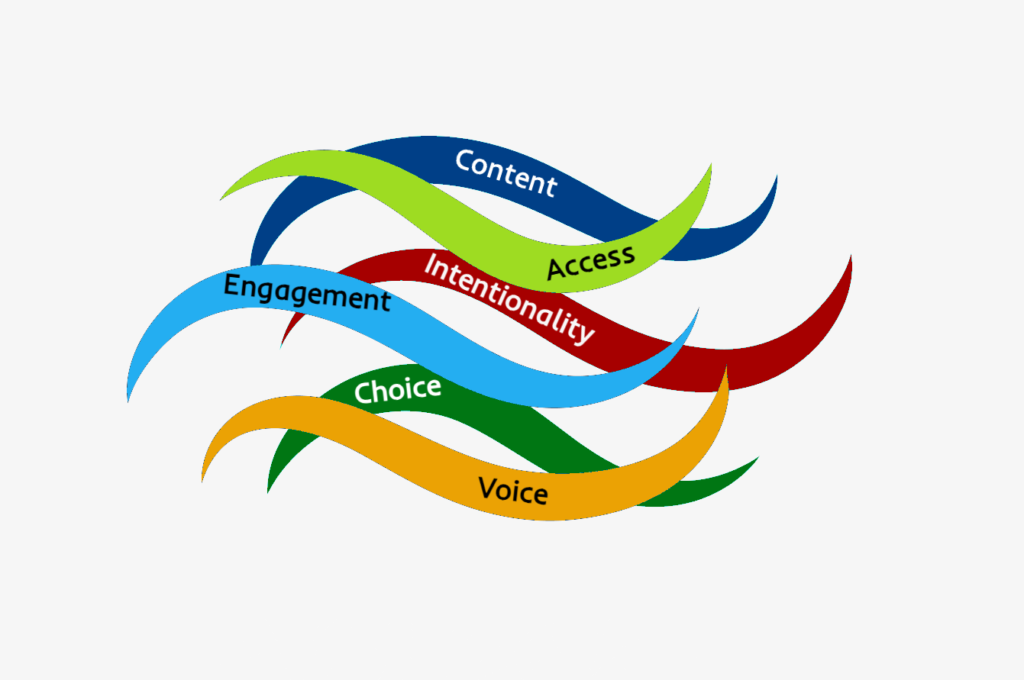Virtual Learning Communities
What if you could bring back more than just good intentions from professional learning experiences?
Our Virtual Learning Communities are different than most online courses in that each VLC has a facilitator who guides the course, provides valuable feedback, and fosters a community of learners. At EdQuiddity, we believe professional learning should:
- Model innovative practices
- Provide new learning
- Have participants design materials to use in school immediately
We now offer an option beyond our in-person professional learning! Online engagement, 25 hours of self-paced engagement, in addition to continual feedback and assistance, and video conference sessions. Work at times convenient for you and have fun challenging your pedagogical thinking.
Only $595 per seat or $4,950 for a 10-pack of seats.
Click the images below for course descriptions.

Design PBLs














Available VLC Schedule
Executive function is critical to students’ academic achievement and social-emotional learning. Focusing, shifting attention from one activity to another, working toward a goal, persisting in a task, catching and correcting errors, and managing time are all executive function skills that students need to be successful in any learning environment. The sudden shift to remote learning during the pandemic transformed education. Executive function skills often determined student resilience and success. The good news is that executive function skills can be developed and accelerated. Participants will explore six key life skill areas that are uniquely supported by executive function and design instructional plans to intentionally build these critical achievement prerequisites in all learners.
Syllabus:
- Understanding how executive function is inextricably linked to the academic achievement and social-emotional learning of students at all developmental levels through the lens of six levels of increasingly complex life skills
- Understanding how executive function develops and how growth can be accelerated
- Understanding the difference between learning and practice activities, and the importance of purposeful “grappling” with content
- Developing instructional activities aimed at building executive function across the seven key components: working memory, cognitive flexibility, planning, reasoning, problem-solving, inhibitory control, and self-awareness
- Developing an implementation plan that includes powerful facilitation strategies and purposeful structures to develop executive function and promote learning acceleration for all learners
Participants in this course will use Dr. Nancy Sulla’s book Building Executive Function: The Missing Link to Student Achievement as a resource. The assigned book must be purchased in advance. Access to MyQPortal is included for all participants while enrolled in the VLC.
“Work smarter, not harder!” AI tools give us the power to do just that. The possibilities are endless! Explore the opportunities for using AI-driven tools to design rubrics, protocols, instructional activities, and more! Also, generate higher-order questions while engaging with your class and write your talking points for lessons and videos. Learn the nuances of using AI as your instructional design assistant and your power partner in the classroom to meet individual student needs through greater personalized learning.
Syllabus:
- Understanding different aspects of AI and how it can look in your classroom
- Leveraging AI as a thought partner in instructional design to support your diverse student population
- Exploring AI tools and resources to support building executive function and SEL skills
- Leveraging AI to design activities, leveled facilitation questions, and more
Access to MyQPortal is included for all participants while enrolled in the VLC.
As more schools honor brain research by offering students longer class periods and fewer courses per day, teachers must rethink how they use time for teaching and learning. This five-week course will explore two models for teaching in a block schedule, providing educators with strategies to maximize student engagement and deepen learning. Participants will design units and lessons tailored for extended periods, whether envisioning a fluid, student-driven approach or a structured beginning-middle-end format. Through hands-on planning and practical applications, this course will position educators to enhance learning and make the most of block scheduling.
Syllabus
- Explore the neuroscience research for the “why” behind teaching in the block and how you can benefit from this research in the classroom
- Explore two models for teaching in the block to identify your comfort level
- Explore structures for maximizing learning in a block situation
- Develop lesson plans for teaching in the block
Participants in this course will use Students Taking Charge in Grades 6-12 by Dr. Nancy Sulla as a resource. The assigned book must be purchased in advance. Access to MyQPortal is included for all participants while enrolled in the VLC.
Creating a learner-centered classroom requires teachers to design opportunities for students to actively engage in their learning and maximize their potential. Designing differentiated learning activities, facilitating those learning activities with meaningful questioning, using a variety of formative assessment strategies and student reflections, and leveraging strategies to build students’ executive function skills all lead to putting students at the center of their educational process. Craft a plan for positioning your students to be active participants in the learning process as you design a classroom learning environment that engages and empowers students, building a greater sense of efficacy for them and for you as their teacher.
Syllabus:
- Exploring opportunities to know and understand your students
- Designing differentiated learning activities for engaging different types of learners
- Developing meaningful questions to promote learning through teacher facilitation
- Designing formative assessments for teacher use and for student self-assessment
- Exploring basic strategies for building executive function in your students
Participants in this course will use Dr. Nancy Sulla’s book It’s Not What You Teach But How as a resource. The assigned book must be purchased in advance. Access to MyQPortal is included for all participants while enrolled in the VLC.
How can teachers help English Language Learners (ELLs) thrive in their classrooms? This VLC will offer strategies based on 7 Essential Elements for ELL Support: Physical Space, Scaffolding, Resources, Explicit Language Instruction, Facilitation, Emotional Wellness, and Social Engagement. Participants will learn actionable strategies to implement to help both students and teachers thrive. Strategies will be tailored to each participant’s grade level and subject area.
Syllabus:
- Understanding the “7 Essential Elements for ELL Support”
- Recognizing the role that students’ academic backgrounds have in implementing these elements
- Learning strategies for each of the 7 Elements
- Making assessment work for ELLs
In this course, participants will leverage choice and technology to provide students with the ultimate differentiated learning environment. They will develop differentiated digital activity lists rooted in rigorous instruction that offer multiple ways to learn and apply content. Participants will explore autonomy, purpose, and mastery as motivators in all learning environments. They will design differentiated digital activity lists to put students in charge of their own learning, creating a structure that allows students to make decisions within a structured framework. Making informed decisions is an essential life skill that teachers can support with intentional structures and strategies.
Syllabus:
- Exploring ends-based teaching as a foundation for differentiation
- Understanding the difference between the 5 types of instructional activities
- Connecting student choice and voice to empowerment and academic achievement
- Exploring cognitive levels and learning styles to develop 5 types of instructional activities for learning anywhere, anytime
- Building a differentiated digital activity list to provide students choice in how and when they engage in learning and practice activities
- Exploring the role of the teacher in an environment that empowers students to take more responsibility for their learning
- Exploring the role of technology to leverage opportunities for differentiation in differentiated digital activity lists
- Developing instructional videos and activities to support differentiation in digital activity lists
Participants in this course will use Dr. Nancy Sulla’s book Reinventing the Classroom Experience as a resource. The assigned book must be purchased in advance. Access to MyQPortal is included for all participants while enrolled in the VLC.
Executive function is critical to students’ academic achievement and social-emotional learning. Focusing, shifting attention from one activity to another, working toward a goal, persisting in a task, catching and correcting errors, and managing time are all executive function skills that students need to be successful in any learning environment. The sudden shift to remote learning during the pandemic transformed education. Executive function skills often determined student resilience and success. The good news is that executive function skills can be developed and accelerated. Participants will explore six key life skill areas that are uniquely supported by executive function and design instructional plans to intentionally build these critical achievement prerequisites in all learners.
Syllabus:
- Understanding how executive function is inextricably linked to the academic achievement and social-emotional learning of students at all developmental levels through the lens of six levels of increasingly complex life skills
- Understanding how executive function develops and how growth can be accelerated
- Understanding the difference between learning and practice activities, and the importance of purposeful “grappling” with content
- Developing instructional activities aimed at building executive function across the seven key components: working memory, cognitive flexibility, planning, reasoning, problem-solving, inhibitory control, and self-awareness
- Developing an implementation plan that includes powerful facilitation strategies and purposeful structures to develop executive function and promote learning acceleration for all learners
Participants in this course will use Dr. Nancy Sulla’s book Building Executive Function: The Missing Link to Student Achievement as a resource. The assigned book must be purchased in advance. Access to MyQPortal is included for all participants while enrolled in the VLC.
As a teacher’s aide, you are an essential part of the classroom community, providing the support that helps students flourish and teachers succeed. Throughout this course, we’ll explore the vital responsibilities of teacher’s aides, from effective collaboration with teachers, administrators, and parents, to supporting students with diverse learning needs. We’ll examine how you contribute to differentiated instruction, cultural responsiveness, and the success of students with IEPs and 504 plans.
Syllabus:
- Explore classroom management and behavioral support strategies.
- Gain insights into social-emotional learning (SEL) and executive functioning (EF) and how to integrate those strategies into each classroom you support.
- Examine how you contribute to differentiated instruction, cultural responsiveness, and the success of students with IEPs and 504 plans.
- Explore effective instructional support techniques, including literacy and numeracy strategies, integrating classroom technology, and co-teaching with the lead teacher.
- Learn strategies for supporting small groups and individual students, and how to leverage digital tools.
Access to MyQPortal is included for all participants while enrolled in the VLC.
How can you ensure that each of your learners is able to access learning and succeed in any learning environment? How can teachers make the most of their time with students to cover a lot of curriculum? The teacher’s role as a facilitator of learning has become more relevant than ever. Explore strategies to help students navigate their learning environment to build academic resilience, accelerate student learning through a focus on the power standards, and support social-emotional learning and executive function. This course will help you rethink instruction to prioritize differentiation and scaffolds that will meet all learners’ needs. Participants will deconstruct their curriculum to identify and teach to the power standards in ways that build foundational standards in the process.
Syllabus:
- Exploring and developing strategies to help students manage and self-regulate in any learning environment (inclusion, self-contained, or other)
- Gaining strategies and structures to support differentiated student engagement
- Developing purposeful opportunities for students to self-assess and reflect, as well as to support students’ executive function and social-emotional learning
- Exploring opportunities to build a learning community with parents, caregivers, aides, and/or paras to create an optimal learning environment
- Deconstructing your standards to identify the power standards and develop maps to connect your power standards to related content
- Generating related problems to drive instruction through the power standards
- Exploring formative and summative assessment strategies to encourage a data-driven environment that pushes students to higher achievement
Participants in this course will use Reinventing the Classroom Experience by Dr. Nancy Sulla as a resource. The assigned book must be purchased in advance. Access to MyQPortal is included for all participants while enrolled in the VLC.
Explore the structures and strategies you can use to gather formative assessment data to drive instruction that is targeted for increased student achievement. Design formative assessments for use with your students that can be used remotely or in person.
Syllabus:
- Developing formative assessments across four categories: temperature gauges, breakpoint assessments, student-directed assessments, and comprehensive assessments
- Using formative assessment data to differentiate instructional activities
- Using formative assessment data to drive facilitation in any environment
- Designing formative assessment grids to allow participants to easily collect and track assessment data from students working in class and remotely
Participants in this course will use Dr. Nancy Sulla’s book Reinventing the Classroom Experience as a resource. The assigned book must be purchased in advance. Access to MyQPortal is included for all participants while enrolled in the VLC.


 In this course, participants will leverage choice and technology to provide students with the ultimate differentiated learning environment. They will develop differentiated digital activity lists rooted in rigorous instruction that offer multiple ways to learn and apply content. Participants will explore autonomy, purpose, and mastery as motivators in all learning environments. They will design differentiated activity lists to put students in charge of their own learning, creating a structure that allows students to make decisions within a structured framework. Making informed decisions is an essential life skill that teachers can support with intentional classroom practices.
In this course, participants will leverage choice and technology to provide students with the ultimate differentiated learning environment. They will develop differentiated digital activity lists rooted in rigorous instruction that offer multiple ways to learn and apply content. Participants will explore autonomy, purpose, and mastery as motivators in all learning environments. They will design differentiated activity lists to put students in charge of their own learning, creating a structure that allows students to make decisions within a structured framework. Making informed decisions is an essential life skill that teachers can support with intentional classroom practices. Participants in this course will use Reinventing the Classroom Experience by Dr. Nancy Sulla as a resource. The assigned book must be
Participants in this course will use Reinventing the Classroom Experience by Dr. Nancy Sulla as a resource. The assigned book must be